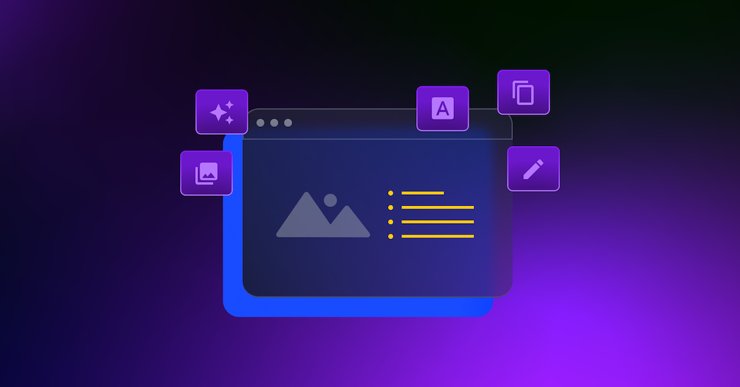Your detailed guide to enterprise CMS
Looking for an enterprise CMS? Here’s your guide to the different options available, and how to choose the best one for your large organization.


All CMSs are the much of a muchness, right?
Well, not exactly. Large enterprises typically have complex websites that need careful consideration when it comes to content management.
In this post, we’ll explore what sets enterprise CMS platforms apart from content management systems for smaller businesses. We’ll also explain how to choose an enterprise CMS, which essential features to be on the lookout for, some of the best options on the market today and how to ensure the CMS platform you opt for meets your business’s complex needs.
What’s an enterprise CMS?
As your business grows, managing content becomes increasingly trickier. Simply scaling your traditional CMS won’t necessarily address this complexity, though. It’s more likely your team will need to migrate to a content management system that’s strategically designed for enterprise-level needs.
An enterprise CMS is aimed at larger organizations. These companies typically have a large headcount, multiple teams and multiple websites, and complex content and marketing operations, requiring a robust platform to manage every aspect of their digital experiences.
Enterprise vs. traditional CMS
Enterprise CMS platforms go beyond traditional CMSs by supporting complex websites, customized workflows, personalization and localization, AI assistance and automation, governance and security, enhanced SEO and more.
The choice between an enterprise and traditional CMS largely depends on your business goals, target audience, and resources. Let’s quickly recap some of the core differences between the two:
- Flexibility
Enterprise CMSs can be customized to suit business-specific needs, unlike traditional CMS platforms. - Multi-channel content delivery
Traditional CMSs are usually limited to delivering content to websites, while enterprise CMSs can push out content across apps, IoT devices, and more. - Security and compliance
Some of the more advanced security features, encryption, and compliance features available within enterprise CMS platforms aren’t standard in traditional systems.
Must-have features for your enterprise CMS
Enterprise CMSs are by their nature quite complex, and comparing features can be overwhelming. To cut through the noise, we recommend looking for the following key capabilities.
Omnichannel content delivery
Flexibility in delivering content is a must for any enterprise. With a traditional (or monolithic) CMS, you’re usually limited to specific platforms and channels. However, CMSs geared towards enterprise use will typically allow you to deliver your content to any device or platform. This means that, regardless of whether your users are on a desktop, smartphone, or IoT device, they’ll still get a consistent experience across all channels.
Scalability
If you’re in the market for an enterprise CMS, chances are you’re already in the thick of managing large volumes of content and are anticipating more of the same in the future. More content. More target audiences. More channels (gulp). So, make sure your CMS can level up alongside your business.
Security
Security is a key consideration when looking for a new CMS for your enterprise business. Look for things like data encryption, as well as access controls and user authentication. You’ll also want to ensure your CMS can comply with any specific standards and regulations your business needs to conform to.
Customization
A customizable CMS gives you 100% freedom to create and update web experiences just the way you want them. You’ll benefit from a wide variety of options to tailor your website or digital experience to your specific needs. These can range from simple adjustments to the appearance of your site, to more complex changes that alter the functionality and behavior of content.
User-friendliness
This one almost goes without saying, but speaking as someone who works inside a CMS on the daily, it needs to be intuitive and easy to use. A drag-and-drop visual editor, for example, makes it super simple (and even semi fun) for your team to build digital experiences in.
Advanced personalization
Enterprise CMSs support personalization by leveraging data to deliver targeted content to different audiences. Whether through content recommendations, targeted messaging, or product suggestions, the ability to tailor experiences at scale is key to ensuring business growth. With more advanced personalization capabilities, big businesses can optimize every aspect of the customer journey, from initial interaction to post-purchase engagement.
Integrations
A CMS that can integrate with other technologies your organization uses (like your CRM, ERP, and marketing tools) is essential for maintaining seamless operations.
Multi-site/multi-language capabilities
Your enterprise CMS should make it easy for your organization to manage multiple websites and languages within a single platform.
Automated workflows
Automated workflows streamline content creation, editing, approvals and publishing. They keep the whole team in the loop, smooth the journey of multistage approval processes, and foster closer collaboration. In short, they’re indispensable.
Permissions
Lots of people. Lots of different content. That can be a lot to deal with. 🤯 Your CMS should keep you in full control by allowing you to create users, groups, and roles, then assign them secure access to different types of content.
Things to bear in mind when moving to an enterprise CMS
- Implementation is more complex: Implementing a new CMS within a large organization comes with its fair share of challenges, from onboarding and system integrations, to stakeholder alignment.
- Cost and ROI considerations: Leadership teams are big into outcomes and numbers. Make sure you drill down into the total cost of ownership (TCO), including the initial implementation, licensing fees, ongoing maintenance and support, upgrades, and customizations. And when it comes to delivering ROI, make sure your chosen CMS has a fast time-to-market.
- Adoption across teams: It’s crucial to get buy-in from different departments (marketing, IT, legal) to ensure widespread adoption and smooth operations.
Forrester Wave™ for CMS
Choosing the right enterprise CMS for your large business
When reviewing CMS vendor options, do an audit of your current content operations to find. Once you’ve done that, ask the following questions about each enterprise CMS you’re considering:
- What exactly does your business need?
Start with an obvious one: your business goals, processes and operations. That way, you can really hone in on the specific needs and requirements your new CMS needs to handle. Consult with your digital, marketing and IT teams on our content creation process, distribution and workflows. - What are some of the technical requirements we need to cover?
What existing tech does the new CMS need to integrate with? What programming language and database do you use, and which enterprise CMSs on the market are compatible with those? - Is it scalable?
As your business expands, so will your content needs. Enterprise content management systems are built to scale seamlessly alongside your growth, accommodating larger content volumes and more complex campaigns. - Is it user-friendly?
While ease of use isn’t always the top priority for enterprise CMS buyers, it really matters to your team. Lower their learning curve and help them get up to speed faster with a CMS that’s easy to use.
Next, look for established vendors with a track record of success in implementing and supporting specifically enterprise CMS solutions. Evaluate their customer support channels, training resources, and available documentation to ensure they can provide the assistance you need throughout your journey.
It's also important to assess the vendor’s roadmap for future developments. Understanding their commitment to innovation and staying ahead of digital trends can give you some insight into the longevity of their platform.
When comparing different enterprise CMS platforms, carefully evaluate their features and capabilities. Look for external user reviews, industry analyst reports and case studies to gauge whether the platform would be a good fit to your enterprise.
Top enterprise CMS platforms in 2025
-
Optimizely: Best digital experience platform for enterprises
Humor us for a moment while we wax lyrical about our very own CMS. 😊Because yep, Optimizely offers a hybrid headless CMS that combines the best of both worlds — the flexibility and omnichannel capabilities of headless CMS with the simplicity and ease of use of a traditional CMS.
Our hybrid approach allows big businesses to develop not only websites, but a wide range of omnichannel digital experiences. Whether you need to power a highly personalized website, deliver dynamic content to mobile apps, or create content for IoT devices, Optimizely’s CMS offers the flexibility to deliver your content wherever your users are.
Plus, unlike purely headless CMS platforms, Optimizely’s hybrid offering gives developers the freedom to build frontend applications in the framework of their choice, while content managers and editors can continue to use an intuitive, integrated content creation platform.
Optimizely CMS doesn’t just simplify the process of managing and delivering content, though. It also comes with powerful features like personalization, experimentation and ecommerce optimization. The end result? Enterprises get the tools to maximize ROI and drive stronger customer experiences at every touchpoint.
Key features
- Hybrid CMS: Combines headless flexibility with traditional CMS simplicity
- Omnichannel content delivery across web, mobile, apps, and IoT devices
- Full frontend and backend flexibility for developers and content teams
- Built-in personalization and advanced testing
- AI-driven content recommendations and advanced SEO tools
- Scalable and secure, fully cloud-based
- Streamlined workflow automation and collaboration tools
- Ecommerce capabilities for seamless online sales integration
-
dotCMS: Best open-source CMS for enterprises
dotCMS is a highly flexible, open-source CMS that offers strong headless functionality for larger businesses looking for extensive customization. Compared to Optimizely CMS, though it falls short in offering the full suite of advanced personalization and experimentation features that enterprises need.Key features
- Open-source and highly customizable
- Full headless CMS support
- Multi-site, multi-language management
- Robust API for seamless integrations
- Lacks built-in personalization and testing
-
Kontent.ai: Best headless CMS for enterprises
Kontent.ai excels as a pure headless CMS, designed for enterprises prioritizing omnichannel content delivery. However, while Kontent.ai is strong on content distribution, it lacks the hybrid flexibility and advanced testing features that Optimizely CMS provides, making it less than ideal for enterprises seeking both content agility and deep digital experience optimization.Key features
- API-first headless CMS
- Strong omnichannel content delivery
- No built-in ecommerce or testing
- Lacks hybrid flexibility
Mission possible: Choosing the right CMS for your enterprise business 🎯
Choosing the right CMS solution has become increasingly complex for large businesses. Integration requirements vary widely, cost structures are complex, and it’s difficult to predict which CMS offerings will remain viable long-term.
Faced with a digital landscape that’s moving incredibly fast, you need to trust not only that your vendor can keep pace with what’s current, but also that their solution truly aligns with your unique business needs and audience expectations.
To make an empowered decision, digital leaders need a systematic way to cut through the noise. Discover insights on what to consider when selecting a CMS for your enterprise.

